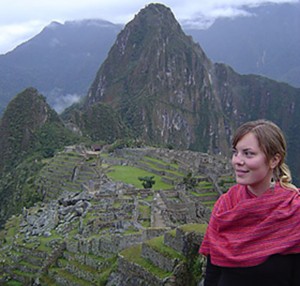 Katie MacAulay graduated from Augsburg in 2009 with a degree in International Relations She is currently working in Uganda with as a Research Associate with Innovations for Poverty Action doing research in food security. Katie did her Fulbright work teaching English in Malaysia. Here she talks about her experience with Fulbright.
Katie MacAulay graduated from Augsburg in 2009 with a degree in International Relations She is currently working in Uganda with as a Research Associate with Innovations for Poverty Action doing research in food security. Katie did her Fulbright work teaching English in Malaysia. Here she talks about her experience with Fulbright.
How did you decide to apply for a Fulbright? What interested you about the program?
I studied International Relations, so the opportunity to live abroad for a year and participate in a fully-funded and prestigious fellowship was enough intrigue for me to apply!
What are some of the most meaningful lessons you learned from your year as a Fulbrighter?
The world is big and the human condition is similar everywhere you go.
How did you change or grow from the experience?
I would like to think I became a more patient, thoughtful and empathetic person and that I have more permanently embodied these traits. Being the de facto expert on all-things-English-related certainly challenged me to take on roles and responsibilities I would not naturally feel qualified for. My year in Malaysia cultivated a deeper sense of self-reliance and confidence that has permeated all areas of my life. Further, my Fulbright experience has informed all career decisions I have made since, drawing me towards international development issues, ultimately leading me back abroad.
The Fulbright program is designed to be an inter-cultural exchange. How did you get to know those in your community? How did you learn about your host country and its culture?
Smiling. It’s the international language. I spent the year incredibly conscious of my outward attitude and expressions. Just appearing warm and inviting goes a long way in making people feel comfortable enough to approach you. I very much felt like my year there was ‘fake it ‘til you believe it’ – that I could teach over 1,000 students English, that I could give an impromptu speech in front of 3,000 community members and dignitaries, that I could advise the State Government and U.S. Embassy in educational areas. Despite what I was feeling internally, smiling and being warm led to the most welcoming invitations from my host-culture, resulting in some of my most memorable moments—sitting cross-legged on the ground, breaking fast during Ramadan with a teacher from my local school; driving along the Terengganu coast and pitching a tent on the beach with one of my students’ families; discussing US pop-culture trends with my students and encouraging debates. Smiling, being curious and asking lots of questions undoubtedly helped me assimilate into my host-culture.
What are you doing now? What are your plans for the future?
I am currently living and working in Kampala, Uganda as a Research Associate with Innovations for Poverty Action, evaluating the impact of an agricultural project. After Fulbright I lived in Washington D.C. for three years working in microfinance, before moving to Uganda, and now intend to pursue an MBA with a concentration in Social Enterprise.
What advice would you give to a current Augsburg student who is considering applying to Fulbright?
Do it! Give yourself as many options and opportunities as possible, post-graduation. At the very least, the application process is incredibly reflective and will prepare you for all of the cover letters and applications you’ll likely be writing in the near future anyway. At the very best, Augsburg is a top producer of Fulbright fellows, which speaks volumes about the amount of thoughtful and constructive attention and support you will receive from the URGO office staff, throughout the process. Give yourself enough time to put forth your best effort, research countries you would like to live/study and/or teach in, do your research, ask lots of questions and start drafting your essays.


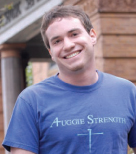


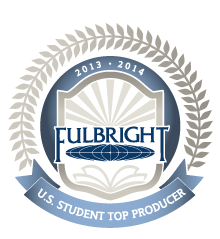 The U.S. Department of State recently announced the complete list of colleges and universities that produced the most 2013-2014 Fulbright U.S. Students. The Fulbright Program is the U.S. Government’s flagship international educational exchange program. The success of the top-producing institutions is highlighted in the October 28 edition of
The U.S. Department of State recently announced the complete list of colleges and universities that produced the most 2013-2014 Fulbright U.S. Students. The Fulbright Program is the U.S. Government’s flagship international educational exchange program. The success of the top-producing institutions is highlighted in the October 28 edition of 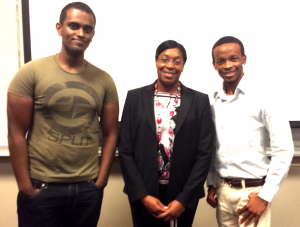 Dr. Dawn Eastmond, Director of Education and Recruitment from the Scripps Research Institute with Augsburg College Students Kirubel Gezehegn (Senior) and Promise Okeke (Junior)
Dr. Dawn Eastmond, Director of Education and Recruitment from the Scripps Research Institute with Augsburg College Students Kirubel Gezehegn (Senior) and Promise Okeke (Junior)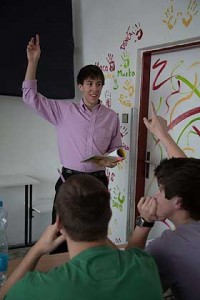 Living and working abroad can be a life-changing experience that reveals new opportunities and enlightens your perspective through engagement with new people and places. For Adam Spanier ’12, the Fulbright English Teaching Assistant (ETA) program provided the challenges and delights of living in a different part of the world.
Living and working abroad can be a life-changing experience that reveals new opportunities and enlightens your perspective through engagement with new people and places. For Adam Spanier ’12, the Fulbright English Teaching Assistant (ETA) program provided the challenges and delights of living in a different part of the world.